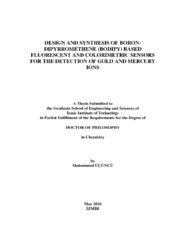Please use this identifier to cite or link to this item:
https://hdl.handle.net/11147/4831Full metadata record
| DC Field | Value | Language |
|---|---|---|
| dc.contributor.advisor | Emrullahoğlu, Mustafa | - |
| dc.contributor.author | Üçüncü, Muhammed | - |
| dc.date.accessioned | 2017-02-13T12:30:44Z | - |
| dc.date.available | 2017-02-13T12:30:44Z | - |
| dc.date.issued | 2016-05 | - |
| dc.identifier.citation | Üçüncü, M. (2016). Design and synthesis of boron-dipyrromethene (BODIPY) based fluorescent and colorimetric sensors for the detection of gold and mercury ions. Unpublished doctoral dissertation, İzmir Institute of Technology, İzmir, Turkey | en_US |
| dc.identifier.uri | http://hdl.handle.net/11147/4831 | - |
| dc.description | xvii, 213 leaves | en_US |
| dc.description | Thesis (Doctoral)--İzmir Institute of Technology, Chemistry, İzmir, 2016 | en_US |
| dc.description | Includes bibliographical references (leaves: 165-180) | en_US |
| dc.description | Full text release delayed at author's request until 2018.06.16. | en_US |
| dc.description | Text in English; Abstract: Turkish and English | en_US |
| dc.description.abstract | The identification and quantification of heavy metal ions such as gold and mercury species in synthetic samples and living cells have crucial importance for scientific research. Even at very low concentrations, heavy metal ions can cause mortal consequences. Hence, there is a huge need for the development of new, sensitive, and selective methods to detect biologically active molecules, heavy metal ions, and anions that have significant effects on humans or animals. Up to now, trace metal analyses have been performed by classical spectroscopic methods such as atomic absorption and emission spectroscopy and inductively coupled plasma mass spectrometry. However, these methodologies require sophisticated devices and must be preceded by complicated sample preparation steps. In contrast to these time-consuming and expensive methods, fluorogenic and chromogenic methods that have high analyte sensitivity and selectivity and easy sample preparation steps and that use cheaper instrumentation have become important alternatives in recent years. There are many organic dye molecules that act as signaling units for fluorogenic-sensing strategies such as rhodamine derivatives, fluorescein, coumarin, and BODIPY. For this thesis, we chose the BODIPY core as a signal reporter unit because of such unique properties as long excitation/emission wavelengths, high molar absorption coefficients and fluorescence quantum yields, and wide pH range for the sensing event. Also, BODIPY dyes can be easily derivatized from their various positions so that they produce an important advantage over other florophore molecules. The main purpose of this thesis is to design and synthesize new BODIPY derivatives that bear highly selective and sensitive receptor units towards gold and mercury ions. In addition, to investigate the photophysical properties of designed molecules in the absence and presence of targeted metal ions in both synthetic samples and living cells. | en_US |
| dc.description.abstract | Altın ve civa iyonları gibi ağır metal iyonlarının sentetik örneklerde ve canlı hücrelerde tayin edilmesi ve miktarının belirlenmesi oldukça önemli bir çalışma alanıdır. Bu tür yapıların insan vücudunda birikmesinin telafisi mümkün olmayan hastalıklara yol açtığı bilinen bir gerçektir. Bu sebepten dolayı yeni, yüksek duyarlılıkta ve gelişmiş tayin yöntemlerine her daim ihtiyaç duyulmaktadır. Atomik absorpsiyon ve atomik emisyon spektroskopisi, indüktif eşleşmiş plazma spektrometresi gibi spektroskopik yöntemler kullanılarak eser miktarda ağır metallerin tayini yapılabilmektedir. Fakat bu yöntemler için karmaşık örnek hazırlama aşamaları ve sofistike cihazlar gerekmektedir. Oldukça pahalı ve zaman alıcı yöntemlerin tersine, yüksek analit duyarlılığı ve seçiciliği olan, daha kolay örnek hazırlama ve daha basit cihazlar gerektiren florojenik ve kromojenik yöntemler ile eser miktarda metal tayini yapmak iyi bir alternatif olabilir. Bu yöntemlerde sinyal iletici olarak kullanılan çeşitli organik moleküller bulunmaktadır. Rodamin türevleri, florosein, kumarin ve BODIPY bu yapılardan sadece bir kaçıdır. Gerçekleştireceğimiz tez çalışmasında uzun dalga boyunda uyarılması/yayılması, yüksek molar absorpsiyon katsayısı ve floresans kuantum verimi, geniş pH aralığında çalışılabilir olması gibi diğer boya yapılarından oldukça üstün niteliklere sahip olması ve kolayca türevlendirilebilmesinden dolayı BODIPY yapısı sinyal iletici olarak seçilmiştir. Bu tez çalışmasındaki temel olarak amacımız BODIPY yapısını altın ve civa iyonlarına karşı yüksek seçicilik ve duyarlılık gösterebilecek reseptör gruplar ile türevlendirmektir. Aynı zamanda tasarladığımız sensör moleküllerinin hem sulu çözeltilerde hem de hücre içerisinde analit varlığında/yokluğunda foto-fiziksel değişimlerini incelemektir. | en_US |
| dc.description.sponsorship | TUBITAK | en_US |
| dc.language.iso | en | en_US |
| dc.publisher | İzmir Institute of Technology | en_US |
| dc.rights | info:eu-repo/semantics/openAccess | en_US |
| dc.subject | Chemosensors | en_US |
| dc.subject | Chemical sensor | en_US |
| dc.subject | Fluorescence chemosensors | en_US |
| dc.subject | Chromogenic sensors | en_US |
| dc.subject | BODIPY | en_US |
| dc.subject | Ions | en_US |
| dc.title | Design and Synthesis of Boron-Dipyrromethene (bodipy) Based Fluorescent and Colorimetric Sensors for the Detection of Gold and Mercury Ions | en_US |
| dc.title.alternative | Altın ve Civa İyonlarının Tayini için Bor-dipirometen (bodıpy) Bazlı Floresan ve Kolorimetrik Sensörlerin Tasarımı ve Sentezi | en_US |
| dc.type | Doctoral Thesis | en_US |
| dc.institutionauthor | Üçüncü, Muhammed | - |
| dc.department | Thesis (Doctoral)--İzmir Institute of Technology, Chemistry | en_US |
| dc.request.email | muhammed.iyte@gmail.com | - |
| dc.request.fullname | Muhammed Üçüncü | - |
| dc.relation.publicationcategory | Tez | en_US |
| dc.identifier.wosquality | N/A | - |
| dc.identifier.scopusquality | N/A | - |
| item.openairecristype | http://purl.org/coar/resource_type/c_18cf | - |
| item.openairetype | Doctoral Thesis | - |
| item.languageiso639-1 | en | - |
| item.cerifentitytype | Publications | - |
| item.grantfulltext | open | - |
| item.fulltext | With Fulltext | - |
| Appears in Collections: | Phd Degree / Doktora | |
Files in This Item:
| File | Description | Size | Format | |
|---|---|---|---|---|
| T001502.pdf | DoctoralThesis | 7.66 MB | Adobe PDF |  View/Open |
CORE Recommender
Page view(s)
608
checked on Apr 28, 2025
Download(s)
384
checked on Apr 28, 2025
Google ScholarTM
Check
Items in GCRIS Repository are protected by copyright, with all rights reserved, unless otherwise indicated.